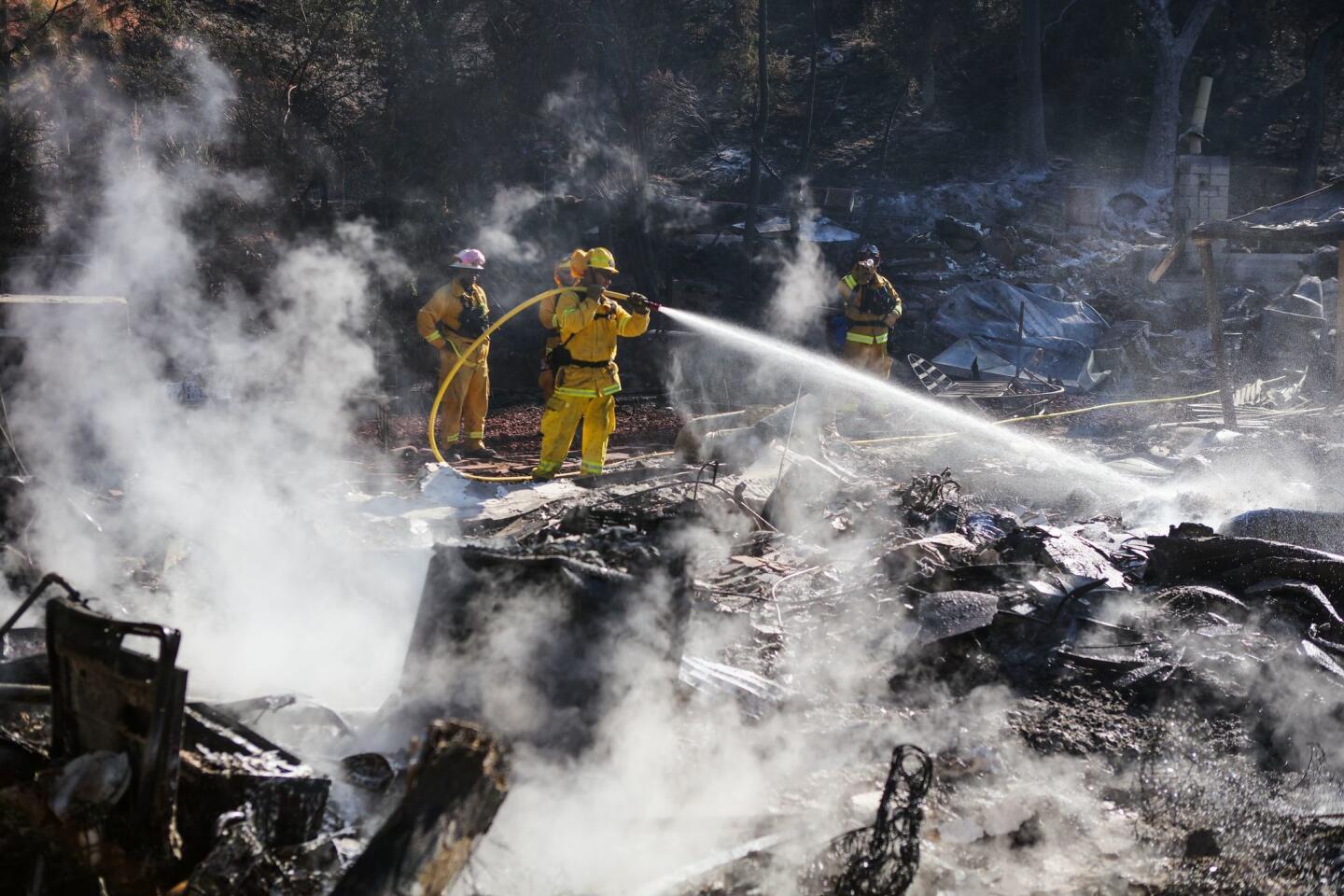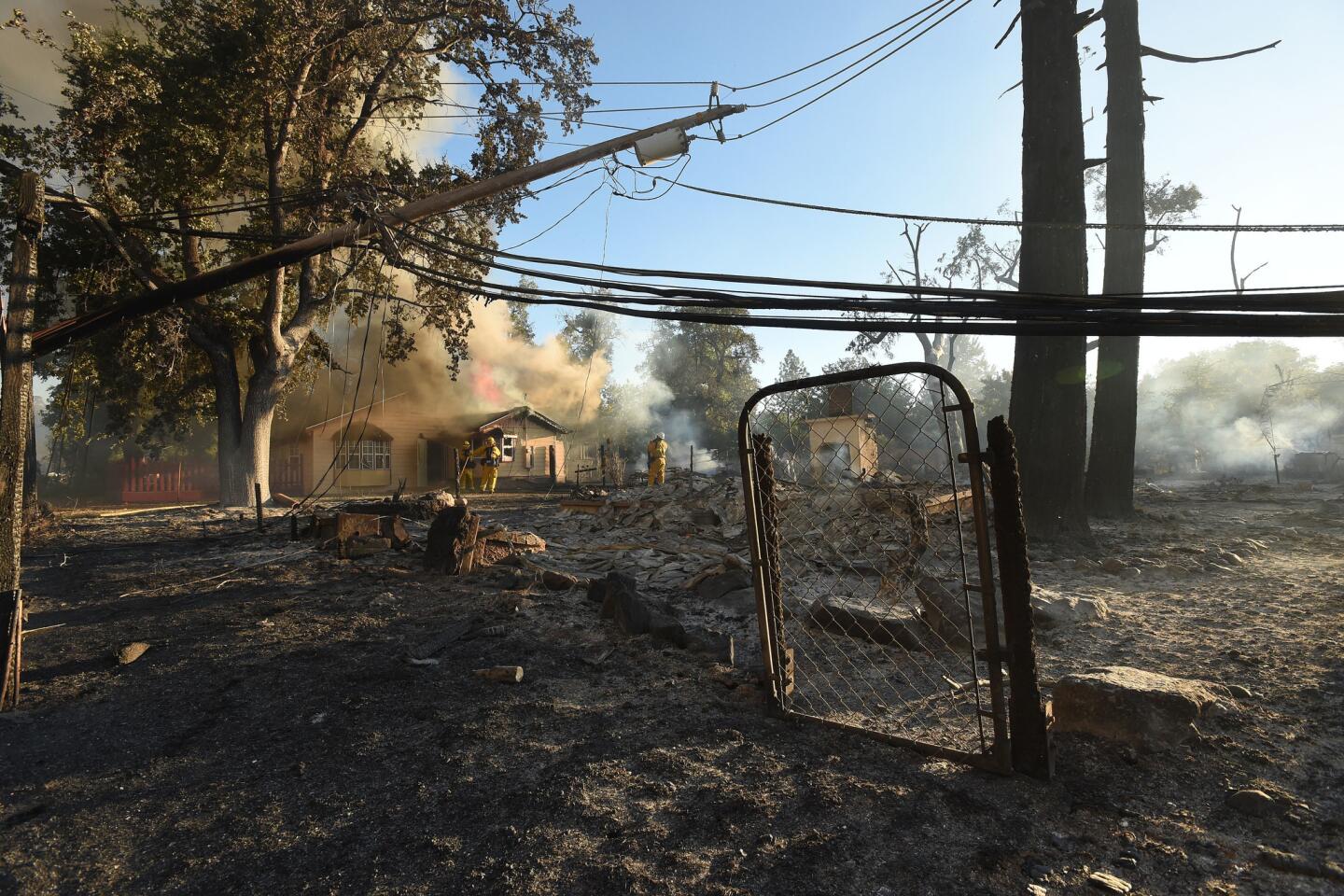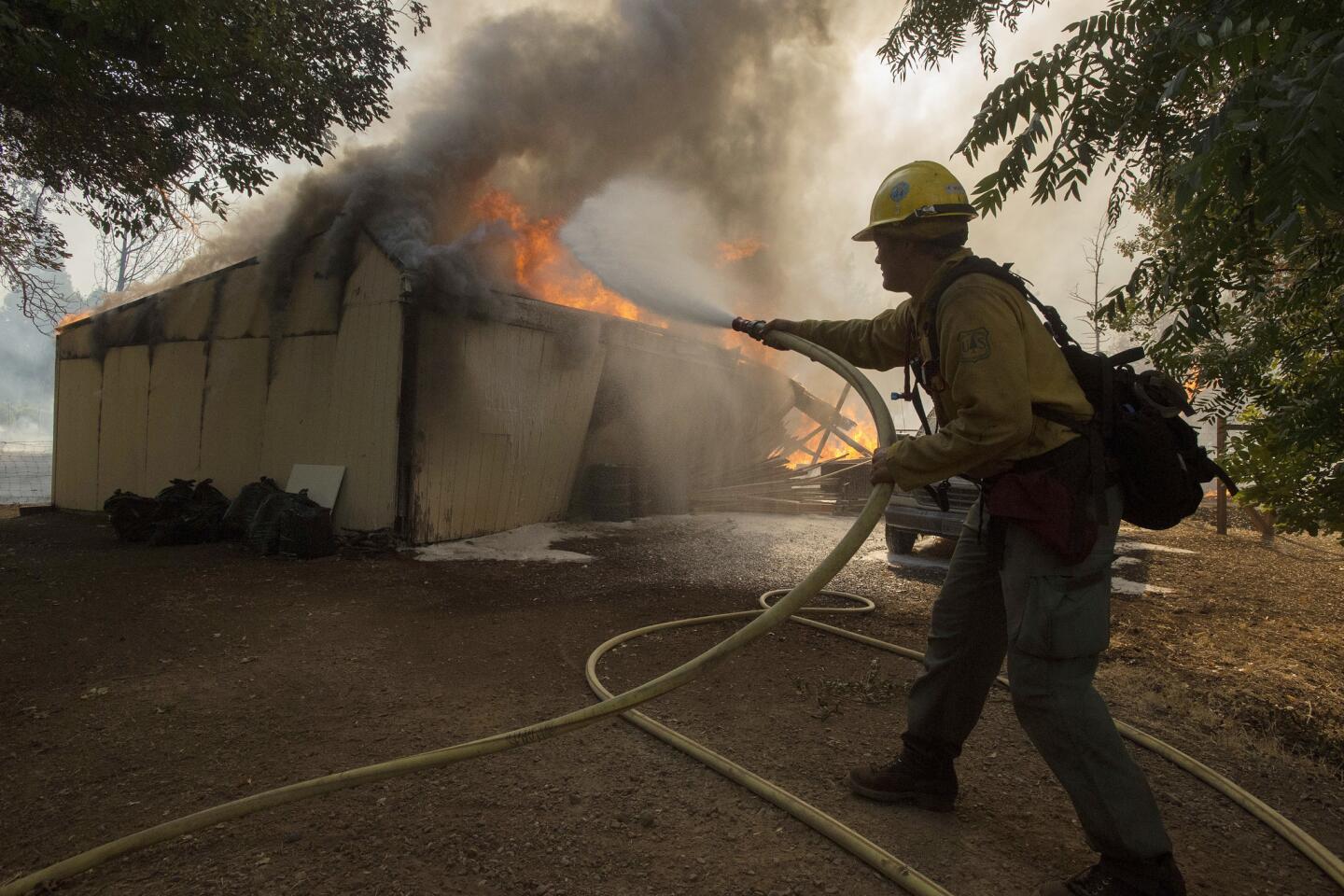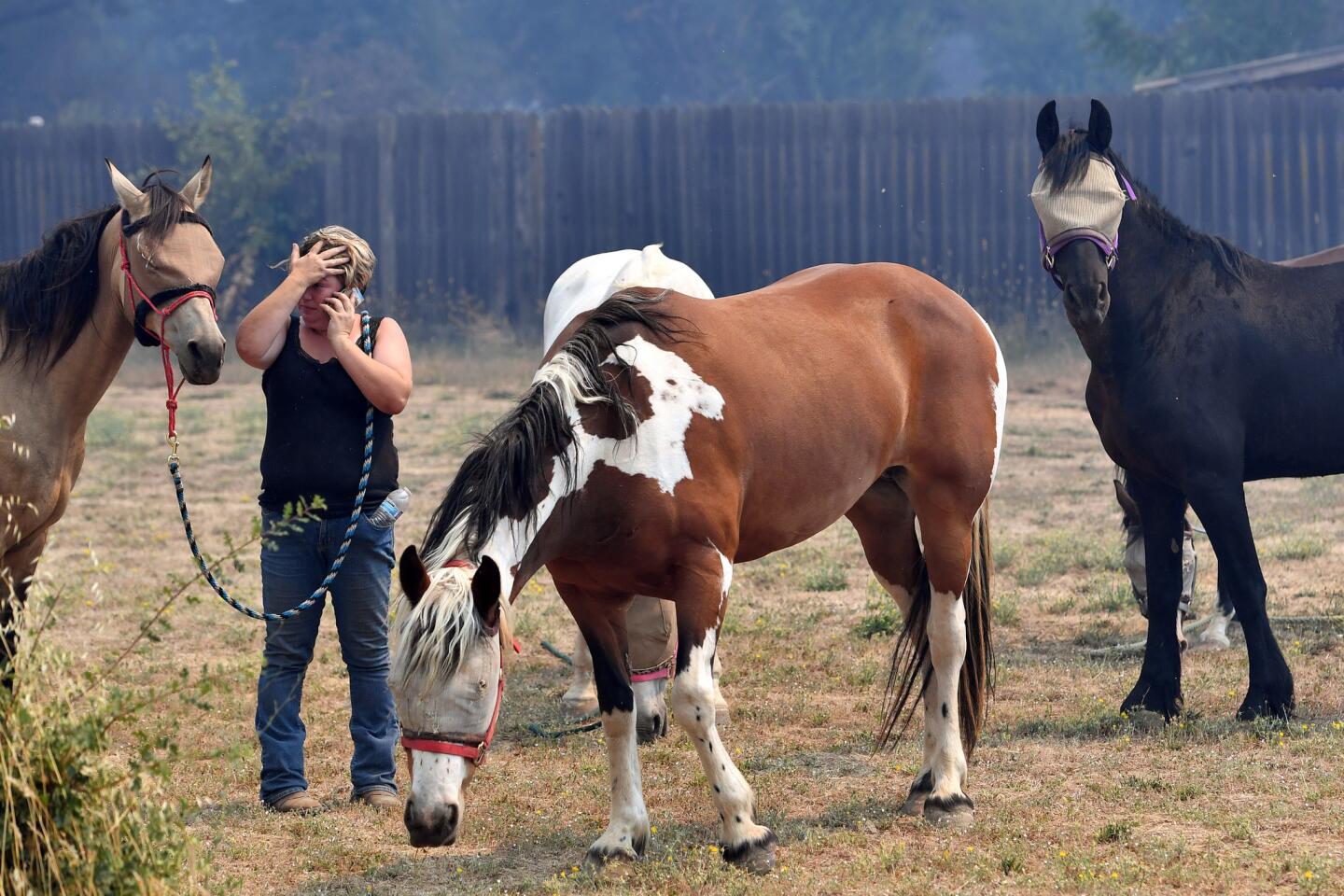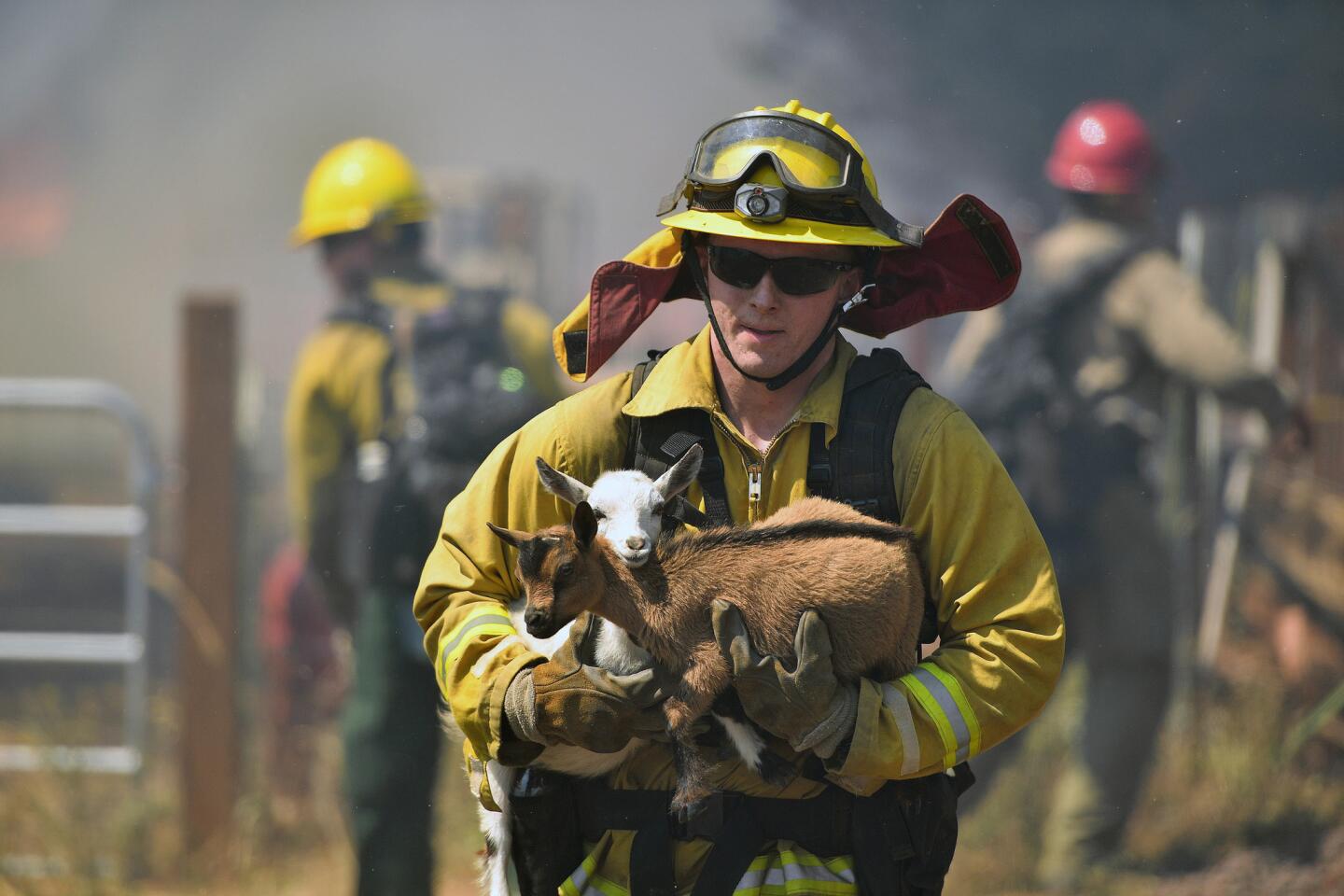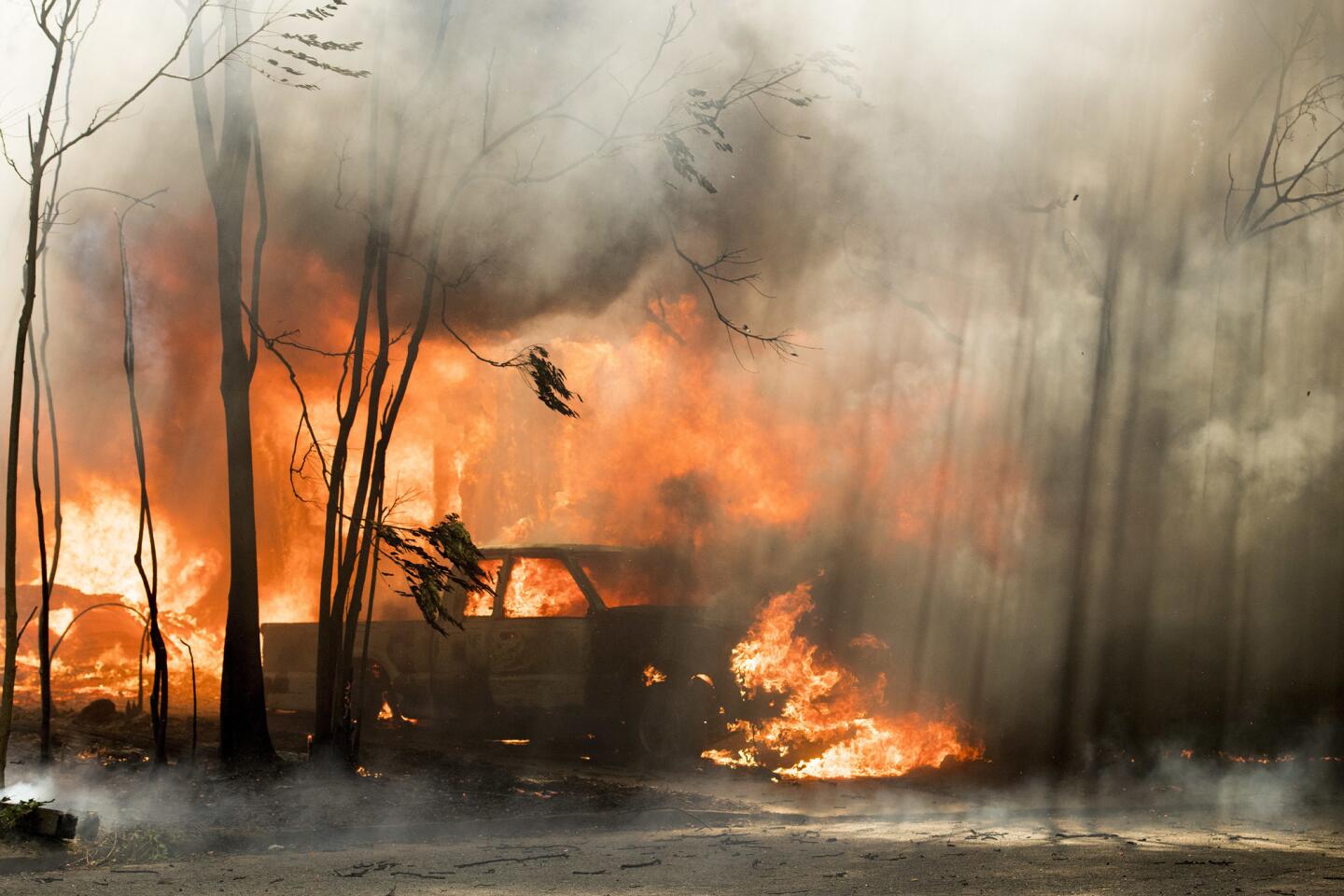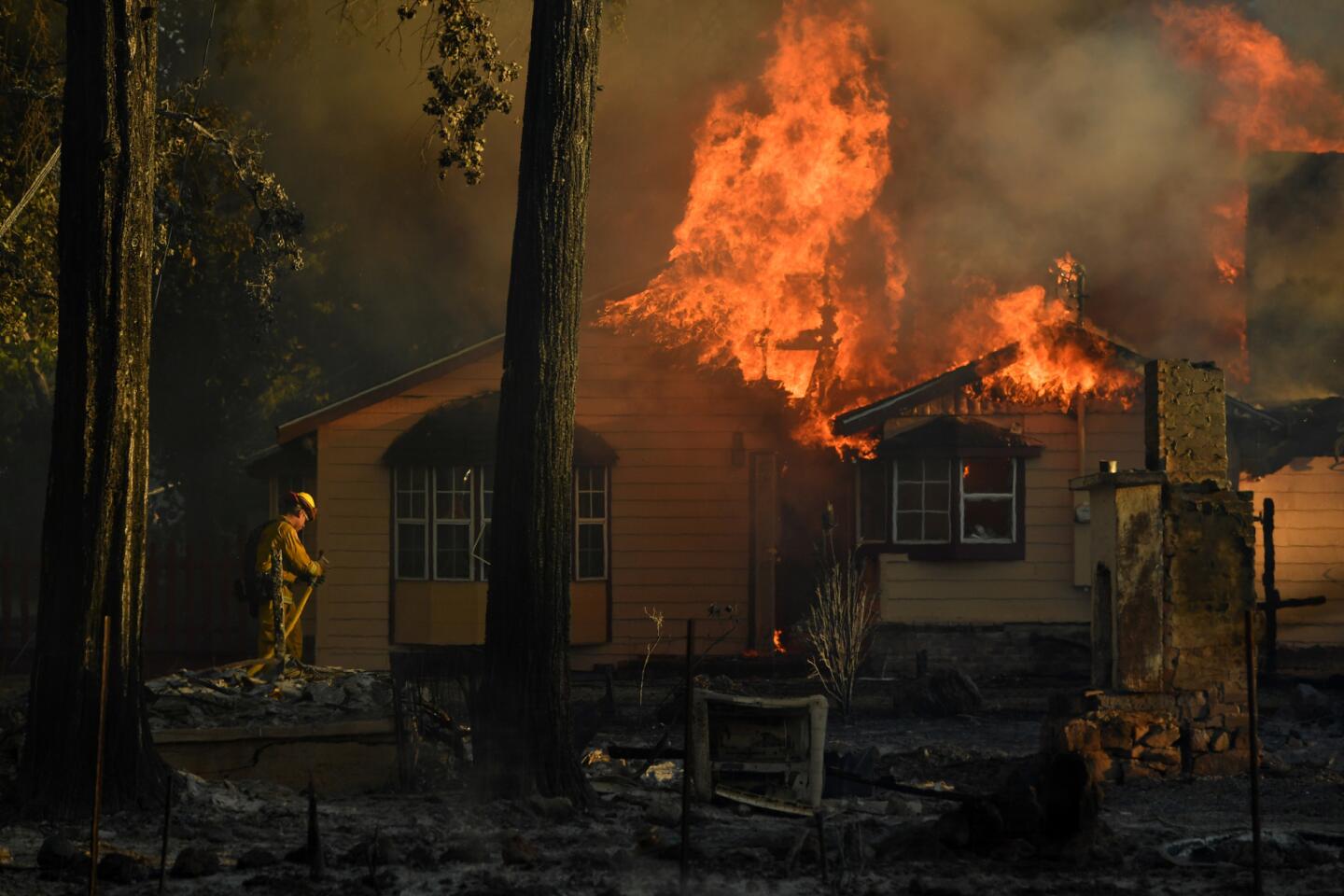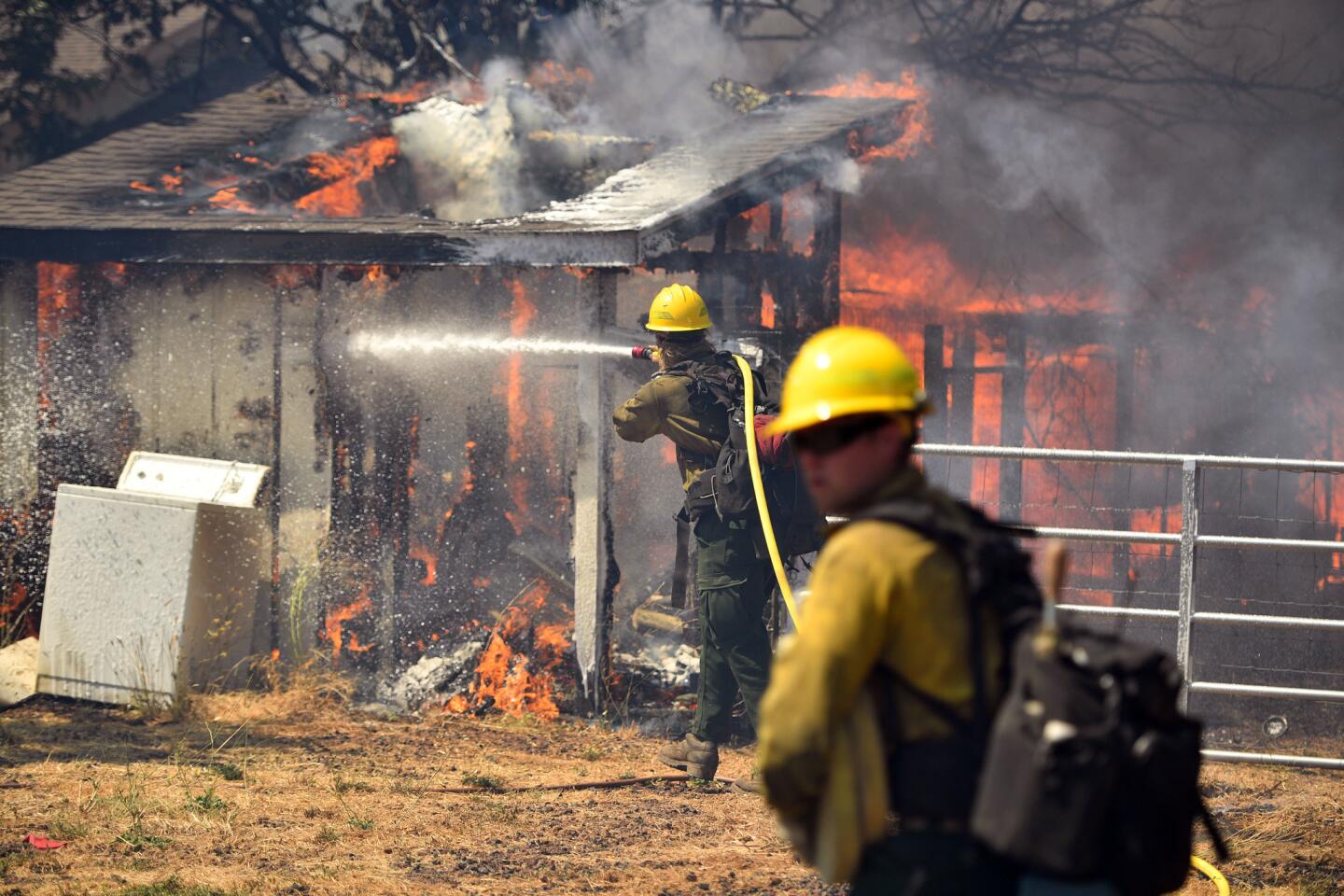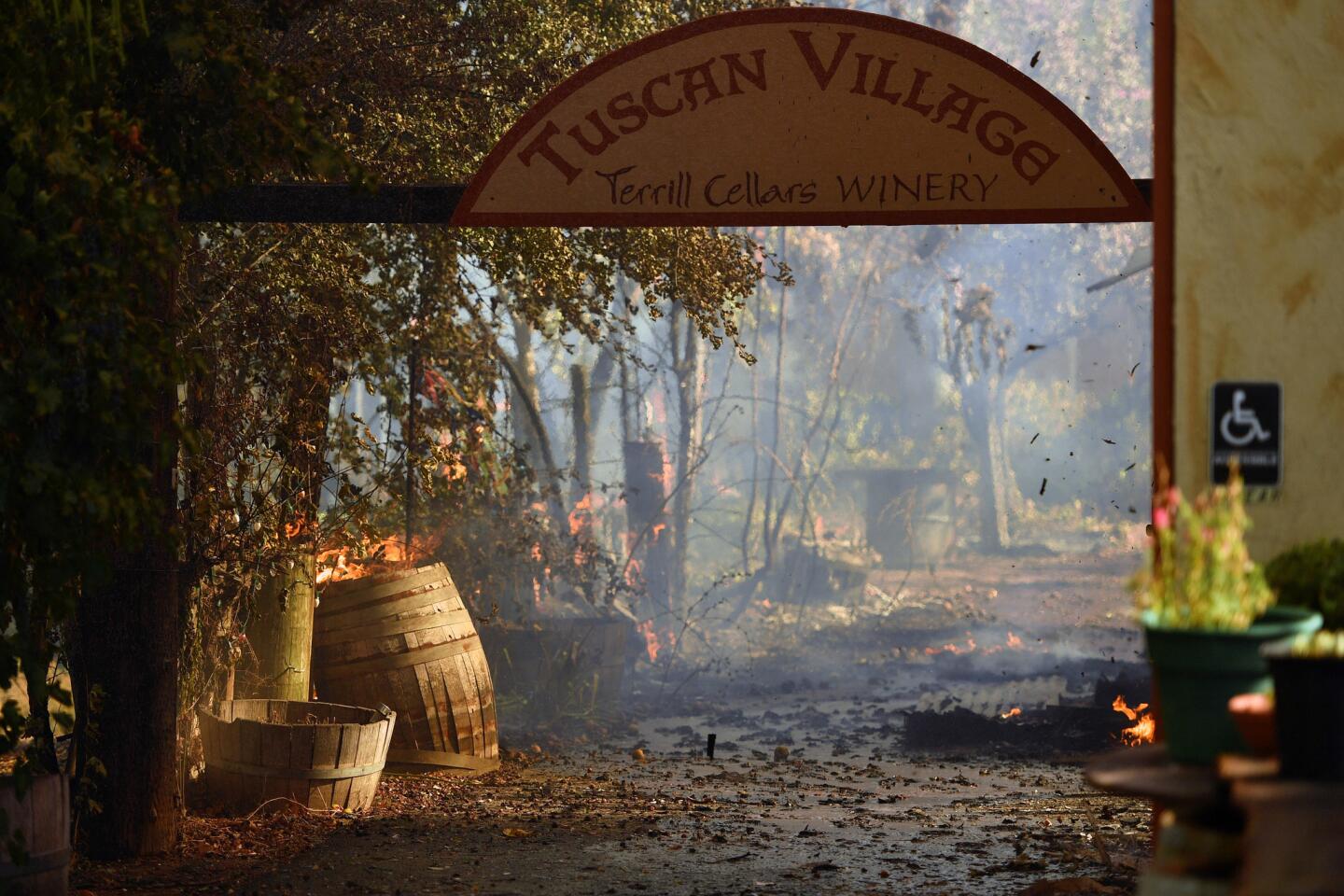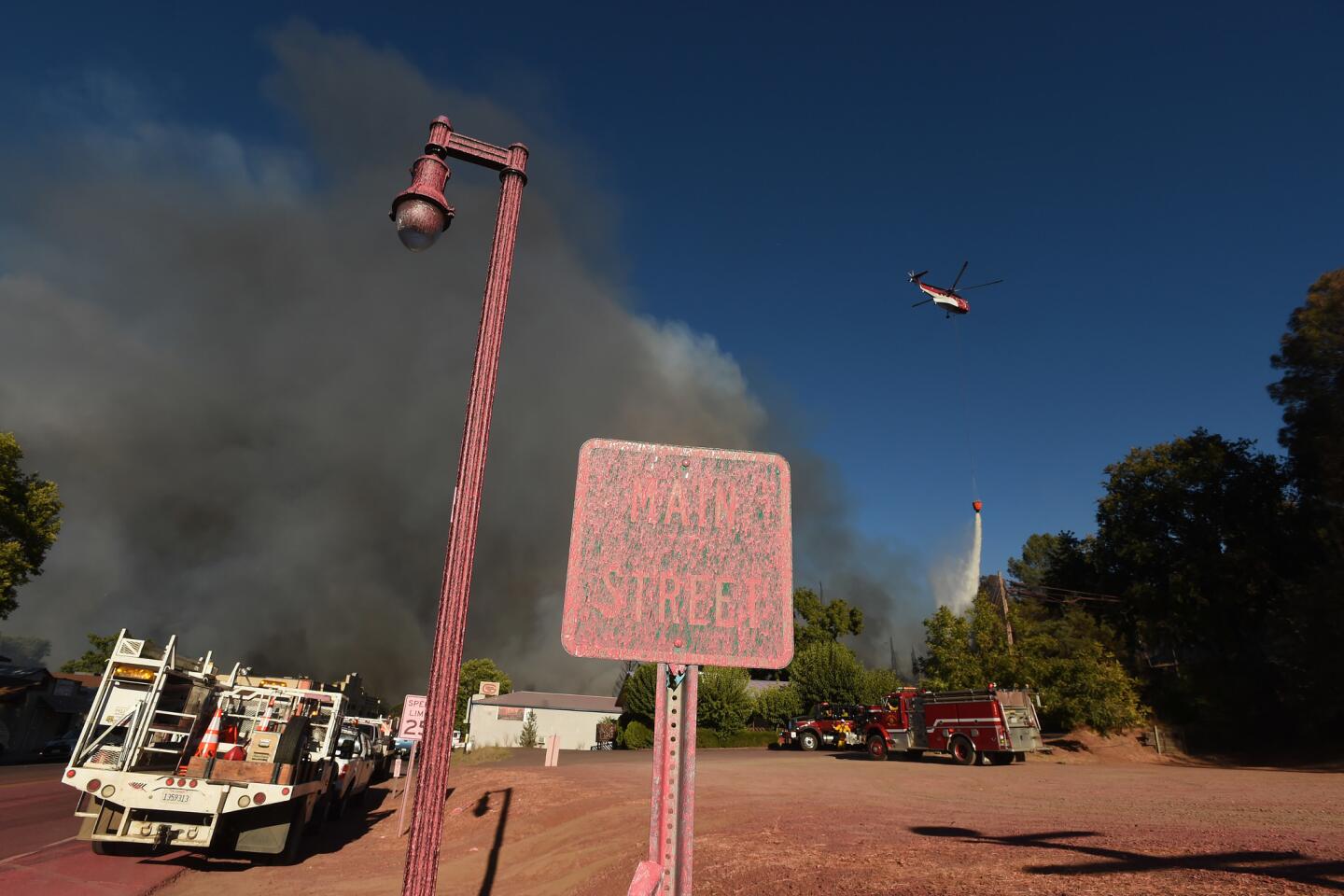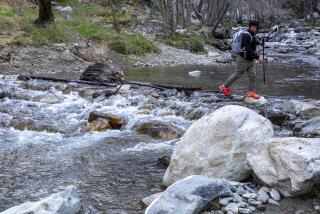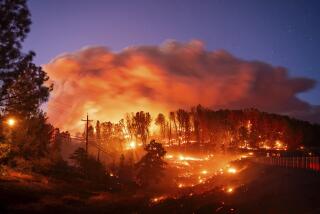California wildfires destroy homes and force hundreds to evacuate
- Share via
Reporting from Middletown, Calif. — A raging wildfire that has destroyed more than 175 buildings in Northern California swelled to 4,000 acres on Monday, forcing residents to flee their lake community as homes and businesses burned to the ground.
By Monday evening, the Clayton fire was only 5% contained, according to the state Department of Forestry and Fire Protection.
Gov. Jerry Brown issued a state of emergency for Lake County, where the blaze has forced the entire community of Lower Lake — more than 100 miles north of San Francisco — to evacuate. The governor’s order will help expedite aid to those affected by the fire.
The fire broke out late Saturday afternoon off Highway 29 and Clayton Creek Road, then doubled in size on Sunday as it reached Main Street in Lower Lake. There, flames ripped through the post office, a winery, a Habitat for Humanity office and several other businesses, the Associated Press reported. Sixteen patients at a hospital in nearby Clearlake had to be transferred to a facility about 25 miles away.
“You can’t imagine what took place,” Cal Fire spokesman Scott McLean said. “There was extreme fire behavior and winds that pushed it across the road into structure after structure after structure. We had airplanes dropping retardant, helicopters dropping thousands of gallons of water — trying to get ahead of this.”
After destroying four homes before sunrise on Monday, the pace of the fire’s growth slowed, according to Lake County law enforcement officials. Firefighters spent the day working to bulldoze a ring around the fire area, while helicopters and tankers dropped retardant and water.
The count of destroyed structures remained at 175, mostly concentrated in Lower Lake’s small, single-street commercial district. But along the wooded ridge behind the shoreline community, dark plumes rose occasionally during the day — a signal that flames overtook another structure or vehicle.
We had airplanes dropping retardant, helicopters dropping thousands of gallons of water — trying to get ahead of this.
— Cal Fire spokesman Scott McLean
The state’s lingering drought has hit Lake County particularly hard and contributed to the rapid spread of flames, fire officials said.
Daytime high temperatures in Lake County, near the fire, are expected to hover around 100 degrees through mid-week, said Eric Kurth, a meteorologist with the National Weather Service in Sacramento. By Thursday, the area should cool slightly, with high temperatures Friday and through the weekend projected in the lower 90s, he said.
The evenings are expected to be cooler, with temperatures forecast in the upper 60s, but they’re “definitely warm evenings,” Kurth said.
“It’s nothing that’s extraordinary, not record-setting, but it is hot — it’s seasonably hot,” Kurth said.
The Clayton fire is burning in an area between last year’s devastating Valley, Rocky and Jerusalem fires, which broke out around the Lower Lake area.
Nearly 200 people forced out of their homes in Lower Lake spent Sunday night in an American Red Cross shelter set up at Twin Pine Casino & Hotel in nearby Middletown — a tiny town that was itself ravaged by the Valley fire, one of the worst fires in California history, just 11 months ago.
The casino was certainly ready: The Red Cross had left behind two trailers of cots and care kits when it pulled out of town last year, and the casino had opened itself up as a fire shelter even before being declared one, said Kyle Lewis, a spokesman for the casino.
“Fire survivors” as they’re called locally — people who lost their homes to last year’s fires — had lived for months in the casino and hotel. The last of them had left just a few weeks ago, Lewis said. And now the hotel is full again with members of the Middletown Rancheria of Pomo Indians of California (which owns and operates the facility) and casino employees forced out of their homes by the Clayton fire.
The back-to-back wildfires have changed how Lewis, 37, a relative newcomer, views life in the rolling hills of Lake County. He was forced from his home last year for a week and considers himself lucky to have just had superficial property damage. He knows many others who lost their homes.
“I think it has made us a very strong community that I am very proud of,” he said.
At Hardester’s Market & Hardware, which has anchored Middletown since 1943, clerks said they had already met their first double-fire survivors: a family burned out of Middletown by the Valley fire just lost their new home in Lower Lake just up the road. A cashier at the flower stand wondered aloud, as many in the community are doing, if the Clayton fire was arson.
“We’ve always had fires, but never this big,” she said. “And in the anniversary of the last three.”
Store owner Ross Hardester said Lake County residents are devastated to be going through such loss again.
“There was such a good buzz; we were starting to recover,” he said. The town was swept by flames last year and had gotten through the first bleak month, and then the painful Christmas holidays, and was starting to see permits being issued and new homes going up on charred lots.
“Now this,” Hardester said. “So many people are on edge again.”
Tessie Espinosa fled her Lower Lake house the moment she saw smoke.
“We’ve learned that you can’t trust for warnings to get out,” she said.
Espinosa is an administrator for the senior center in Middletown, where elderly clients interrupted her every few minutes Monday for updates on what was destroyed the night before and what was still standing in Lower Lake. Her tone was light and reassuring — but on the “I am not sure” list is her own house.
She pulled out her phone and showed a state map of the four major fires that have affected the region. She pointed at a small, unburned area in the center.
“That’s where we live,” she said.
The Clayton fire is one of several wildfires burning throughout California.
The Chimney fire that broke out near Lake Nacimiento in San Luis Obispo County has burned 5,400 acres, destroyed 12 structures and is threatening 200 more, Cal Fire said Monday.
Citing the Chimney fire’s damage to homes and critical infrastructure, Brown also issued a state of emergency for San Luis Obispo County.
Evacuations have taken place in a handful of communities, including Running Deer Ranch and Cal Shasta. Two people have been injured by the blaze.
The fire was first reported about 4 p.m. Saturday near the intersection of Running Deer and Chimney Rock roads, according to Cal Fire.
Active through the night, the fire was slowed about 1 a.m. by air pressure at a higher elevation pushing down and trapping cooler temperatures, Cal Fire spokesman Daniel Berlant said. This blanket, known as an inversion layer, prevents smoke from rising and decelerates any flames.
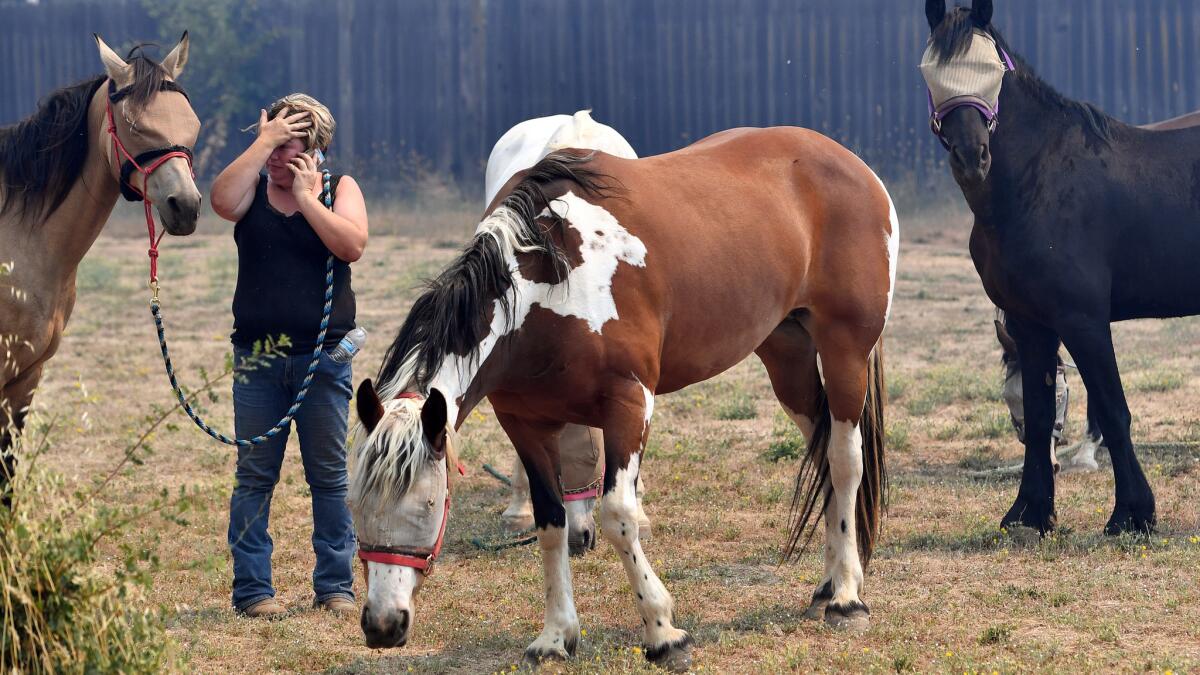
Once that inversion layer began to lift Sunday, the Chimney fire increased in activity, prompting officials to bring in additional firefighters and resources from across the region.
Berlant said several hundred fire personnel were on the scene, as well as large air tankers.
“It’s been burning this afternoon at an explosive rate,” he said.
The fire was 10% contained.
The Soberanes fire, a deadly blaze burning north of Big Sur, has wiped out nearly 60 homes, burned more than 74,600 acres and claimed the life of a bulldozer operator.
Cal Fire officials said the fire, which was started by an illegal campfire, was 60% contained.
The wildfires underscore the elevated risks Southern California faces as it endures yet another summer heat wave, which forecasters say will continue until Wednesday.
The combination of very hot, dry and windy conditions increases the potential for wildfires in the mountains of Ventura and Los Angeles counties, as well as in the foothills in Antelope Valley, said Rich Thompson, a meteorologist with the National Weather Service.
Several Southland communities saw triple-digit temperatures over the weekend, including Van Nuys, Chatsworth and Palm Springs. On Sunday, temperatures hit 104 in Woodland Hills and 111 in Thermal.
Times staff writer St. John reported from Middletown, and Branson-Potts, Vives and Knoll from Los Angeles. Times staff writers Matt Hamilton, Erica Evans and Cindy Carcamo contributed this report.
ALSO
Is the shift to permanent housing making L.A.’s homelessness problem even worse?
School’s out for only part of the summer: Why classes are starting earlier and earlier
UC Berkeley cold-case killing is solved, bringing closure to Agoura Hills family
UPDATES:
6:25 p.m.: This article was updated with additional details on the size of the Chimney fire.
5:30 p.m.: This article was updated with details on the growth of the Clayton fire.
12:44 p.m.: This article was updated with a weather forecast and interviews from Lake County residents.
11:23 a.m.: This article was updated with interviews from a Red Cross evacuation center.
9:10 a.m.: This article was updated with new details from fire officials.
This article was originally published at 5 a.m.
More to Read
Sign up for Essential California
The most important California stories and recommendations in your inbox every morning.
You may occasionally receive promotional content from the Los Angeles Times.
